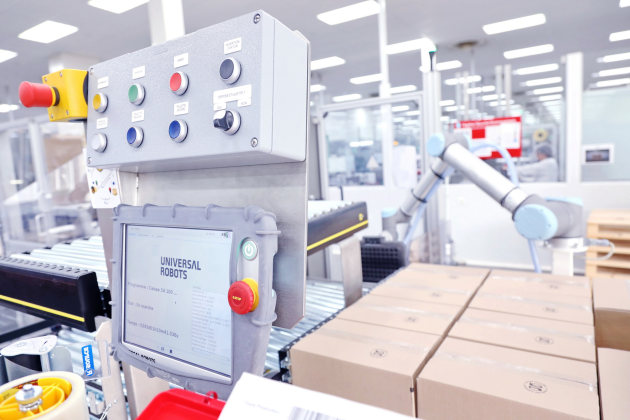Australia has some of the highest labour rates in the world, so naturally, optimising processes and using skilled labour where most valuable makes sense. While some are still of the opinion that automation is costing jobs, automation is in fact creating jobs and enhancing productivity.
As production increases, it requires more people to manage the upstream and downstream of the process increase and allows businesses to make more profits. This gives businesses more time to train and upskill their team members in areas more useful to the company.
Adding to the complexities of manufacturing is the need for stringent health and safety requirements which remains a key focus for manufacturers of all sizes.
In a recent international success story, Universal Robots (UR) helped global healthcare brand Sanofi to free up time where it was needed most.

Seven UR10 collaborative robots (cobots) were deployed at Sanofi’s Tours site in France. The integration into packaging lines was used to meet new productivity requirements, that optimised the organisation and reduced load carrying and operator movements in palletising boxes with tablets and capsules.
Thanks to the installation of the UR cobots, Sanofi has increased its production and improved health and safety related to the reduction of musculoskeletal disorders of its operators. These employees are now able to focus on higher value-added tasks.
Darrell Adams, head of Southeast Asia Oceania for Universal Robots, believes the same level of success can be experienced in our local markets.
“Sanofi wanted to reduce the load carried by the operators working on the line. While one cardboard box wasn’t very heavy, lifting a total of 300 to 700 kg per person per day quickly added up,” Adams said.
Compact, safe and flexible
Used for palletising, these seven UR10 cobots offer a payload of 10kg and a reach of 1.3 metres. According to Sanofi Tour’s new works manager, Giles Marsal, these compact cobots were ideal for this application where an arm needed to be installed between two pallets.
“The team was pleased with the ease of programming and the cobots’ flexibility, making it possible to add various sized grippers in just a few seconds,” Adams said.
“The cobots continue working hard, loading and unloading pallets at the end of the line with no strain at all. The application also offers the possibility to change pallets next to the palletising robot safely”.
Sanofi also noted that the integration of these cobots has brought ergonomic benefits in terms of load carrying, travel and a notable reduction in the work time one the line for its operators.
“Marsal was quoted saying that thanks to ‘cobot discovery days’, Sanofi employees have now bought in and the cobots are well received. They now look to these cobots as a good collaborator rather than a threat. They are easy and safe to work with and have helped avoid long-term health risks for Sanofi’s employees.”
Adams said just like Sanofi, manufacturers around Australia can also benefit from deploying cobots in a range of industry sectors.
Universal Robots is represented in Australia by APPMA member Scott Automation & Engineering,, as well as Andrew Donald Design Engineering; Auto Control Systems; Mobile Electrics (Mobile Automation; and Collaborative Robots Australia (The Robot People).






